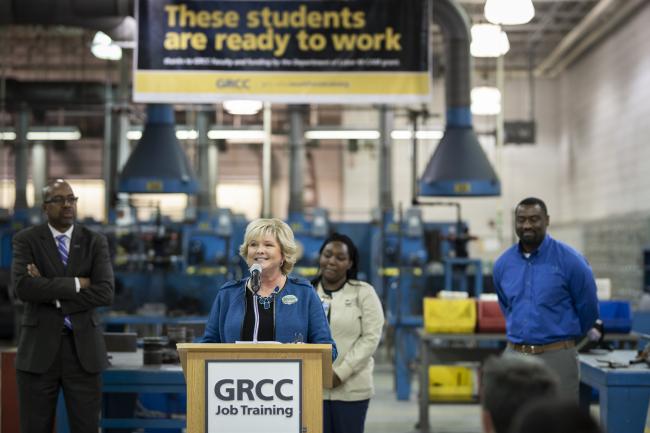Nov. 13, 2018 GRAND RAPIDS, Mich. — Grand Rapids Community College’s noncredit workforce programs generate hundreds of millions of dollars for the West Michigan economy, according to a groundbreaking analysis focusing on the impact created by alumni income, companies attracted and expanded by training programs, and grant spending.
Emsi, a leading provider of economic impact studies and labor market data, analyzed the impact of GRCC's noncredit workforce programs that offer residents training opportunities for in-demand careers while building the region’s skilled workforce.
Using data from the 2016-2017 fiscal year, the analysis determined:
- Kent and Ottawa counties experienced a $294 million economic impact from companies attracted to the region or that expanded existing operations, in part, by GRCC training opportunities, affecting about 3,000 jobs, in this year.
- Past and present students of GRCC noncredit programs generate $130 million annually in added income to the region.
Also, between 2014 and 2018, GRCC was awarded 23 workforce training grants with an economic impact of about $16.6 million, representing new dollars brought to the GRCC service region of Kent and Ottawa counties. The grants, largely from federal government sources, will primarily be spent during the next five years.
The independent study follows a 2017 report that GRCC’s credit programs add $447 million annually to the economies of Kent and Ottawa counties.
“This data shows the unique and vital role that GRCC plays in West Michigan, and the opportunities our programs provide for all of the people we serve,” GRCC President Bill Pink said.
“Our noncredit workforce programs reflect tremendous collaboration with West Michigan employers and community partners. They also open up a variety of pathways to success for our residents, from certificates to apprenticeships to training in their own workplace.”
Pink said the workforce programs are part of a culture of lifelong learning, with many adults returning to add skills as technology rapidly changes careers and creates new fields. Many students also earn certificates in workforce programs then continue their education to earn associate and four-year degrees.
GRCC has partnerships with nearly 421 area employers to provide noncredit training, with 61 participating in customized training programs.
The college has 17,194 students in workforce training, continuing education and professional development, and customized training programs -- up 53% from the 2016-2017 school year. Also, 202 students are in 612-hour job training programs, up 35%. Nearly 350 students are in noncredit electrical apprenticeship programs.
More than 100 people have been trained for Johnson Controls. Carlos Piggee, a high-performance team coordinator for the company, said Johnson Controls also works with students in apprenticeship programs, in addition to those in noncredit programs.
"GRCC has played a key role in helping Johnson Controls grow," Piggee said. "Through opportunities like the Michigan New Jobs Training Program, we're able to partner with the community college so our employees get opportunities for skills needed for new jobs, or to add to their skills as technology changes existing jobs."
Data used in the study came from several sources, including the academic and financial reports from GRCC, industry and employment data from the U.S. Bureau of Labor Statistics and the U.S. Census Bureau, and outputs from Emsi’s Multi-Regional Social Accounting Matrix Model.
Elizabeth Pena is a student in GRCC's medical assistant apprenticeship program, and graduates on Dec. 14.
"I found the program about a year ago. I was a lost individual," she said. "I have three children. I wasn't sure what I wanted to do with my life. This program caught my attention because I was able to work and support my family and continue my education. I made it. I'm one of the 3,000 families that this program has helped."
Emsi economic consultant Susan Hackett said the Idaho-based company, which serves clients nationally and internationally, customized a new methodology to study the economic impact of GRCC’s noncredit workforce programs.
“Those programs do great things for students and local businesses, but can be difficult to quantify their economic impact’” Hackett said. “This project was a great opportunity to continue developing our economic impact model to fit the needs of community colleges and stay relevant in today’s economy, and we hope to replicate this work for other colleges.”
Grand Rapids Community College has been offering educational opportunities in West Michigan for more than 100 years. Established in 1914, the college offers degree courses, certification and training programs, and workshops and personal enrichment classes. Offerings are held on GRCC’s downtown Grand Rapids campus, and at several locations throughout Kent and Ottawa counties, as well as through distance learning.
